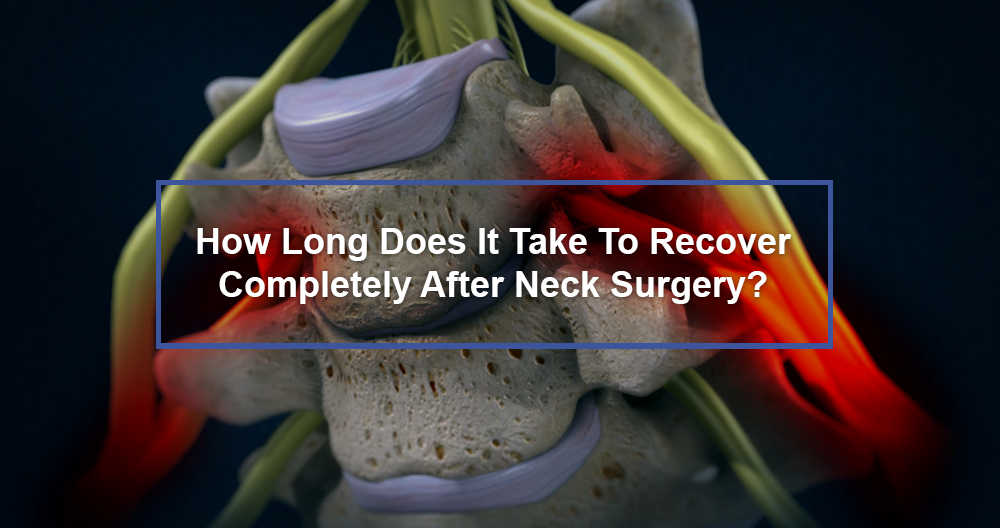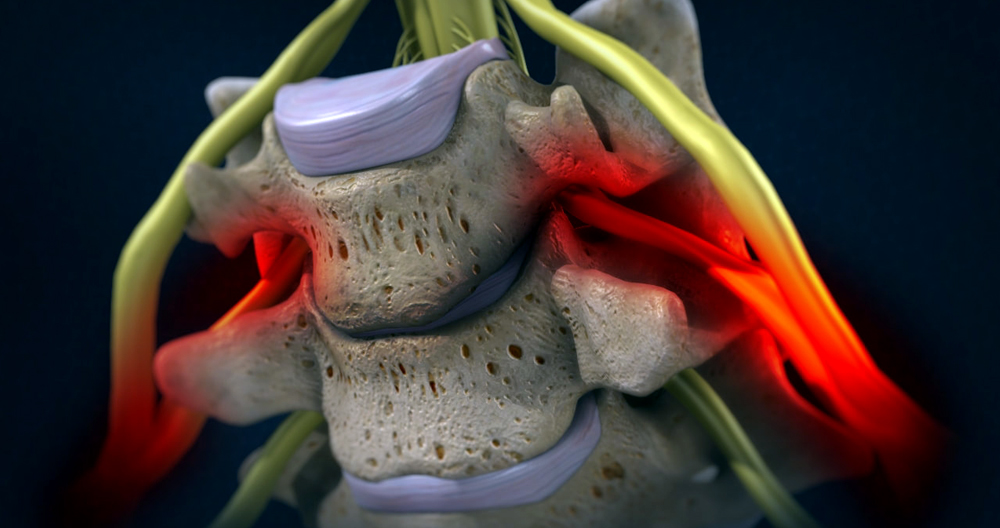
Neck surgery is an option if you have tried all the possible options for managing your neck pain. Many people decide to have neck surgery. However, there are many unknowns, such as how long it takes to heal.
Because the neck is such a sensitive and complex part of the body, some patients might be worried about any medical conditions or treatments that may affect it. This information will help you to understand your surgery and the recovery process. It will also provide you with some insight into factors that can affect recovery.
What is Neck Surgery?
It can be difficult to decide if you need neck surgery. It is difficult to determine if you need neck surgery. You may notice that your discs are deteriorating, which can cause them to grind together.
Your neck nerves may be pinched. These are just a few examples of situations where neck surgery might be necessary. Usually, surgery is required when all other options have failed and you are not eligible for any other treatments.
- Cervical Radiculopathy is a condition where the root of the nerve gets pinched by a herniated disk. This causes bone spurs which can irritate the nerve.
- Spinal stenosis is a condition where the spaces in the spine are too narrow. This can cause spinal nerve compression, which can lead to numbness or pain.
- Degenerative disc disease is a condition where the discs press together and pinch the spinal nerves. Your discs may become brittle in this situation. This is a condition where the discs are no longer capable of stopping the vertebrae grinding together. It can lead to severe pain.
Common Neck Surgeries
Many neck surgeries address issues with one or more of the spinal nerves. If there is an abnormality in your spine, you may have nerves at each level of the spinal cord. Your discs are jelly-like, soft structures that act as cushions between your spine’s bones. Spinal abnormalities can often be attributed to your discs. They can become degenerate, or become displaced, which could compress or irritate a nerve. If the foramen (the space where the nerve exits the spine), becomes tightened for any number of reasons, it can also cause the nerve to become compressed. These issues can be resolved using one of the following three methods, regardless of what cause.
Anterior Cervical Discectomy
An anterior cervical discectomy can be used to treat disc pain that has degenerated or herniated. Your surgeon will access your spine through the anterior or front and then remove the disc. Then, a bone graft is used to stabilize the area. Your surgeon may also remove bone spurs pressing on your spinal cord.
Most patients can leave the hospital within 24 hours of the operation being completed. Your level of pain, mobility, and ability to eat will all be considered when you are discharged. A return to normal activity after you have left the hospital should take between three and six months. Your recovery time is the most important thing for postoperative stability. If your bone graft fails to fuse quickly, your recovery will be slower. To help you better understand your activity, your doctor will monitor the progress of bone fusion.
Foraminotomy and Posterior Cervical Discectomy
In that the objective is to remove disc tissue, a posterior cervical discectomy can be similar to an anterior cervical discectomy. There are two main differences. A posterior cervical discectomy will see the surgeon approach the disc from the back, rather than the front. A posterior cervical discectomy does not involve bone fusion and only involves removing a portion of the disc.
A posterior cervical foraminotomy’s sole purpose is to increase the space through which your nerve exits from the spine. It doesn’t address pain caused by movement in a pathological joint. This will allow the nerve to be more irritated, and therefore will cause less pain. The surgeon will make a small incision at the back of your neck. He or she will then gently remove the nerve and clean out the surrounding space, called the foramen. Your condition may require the removal of bone spurs and displaced disc material.
Patients are typically discharged from the hospital in 1-2 days after completing both procedures. Light work is possible after 4 to 6 weeks. Full recovery takes 2 to 3 months. Your doctor may recommend physical therapy sessions to help with recovery.
Cervical Arthroplasty (Disc replacement)
A cervical arthroplasty is the procedure of replacing damaged cervical discs with artificial ones. The artificial disc functions as a joint and allows normal movement. In that all of the discs are removed, this procedure is very similar to anterior cervical discectomy. There is a difference in the type of implant that is placed following discectomy.
This procedure involves a surgeon making a small incision at the front of your neck and gently removing the soft tissues. After the area has been exposed, the disc and bone material are removed and the artificial disk will be inserted. After the tissue is repositioned, the incision can be closed.
The length of stay in hospital after the procedure will vary depending on the patient’s condition. However, most patients are discharged the next day or the next day. Light work can usually be completed within one to two weeks of surgery. Regular activity can resume after six weeks.
Factors that Affect Recovery Time
Many factors can impact how long it takes to heal from neck surgery. The most important factors that affect recovery time are how bad your condition is and the type of surgery you had. Others factors include:
- Your age. You are more likely to recover faster if you’re young than if you’re older. The average age of a patient is usually shorter than that of a younger person. However, neck surgery is very rare in younger patients.
- Your overall health. Your recovery time may be longer if you have any pre-existing conditions or lead an unhealthy lifestyle. Your recovery time will be shorter if you are healthier at the beginning of the procedure. Your wounds will heal faster if you are not overweight, smoking, drinking excessively, or have chronic diseases.
- Your lifestyle. People who live an active lifestyle and are involved in regular, healthy physical activity tend to recover quickly. However, those who work very physically demanding jobs tend to heal slower. It will take longer to return to a high level of activity if you are very active.
How long does it take to recover from neck surgery?
Neck surgery is the most physically demanding type of surgery. Because it affects the cervical spine, which helps to support your head and facilitate movement, this is why neck surgery is so difficult. It is quite different to a broken arm that requires only a little rest and a cast.
After surgery, it is difficult to relieve all pressure from the neck. This is why recovery can take longer than other types of surgery. To speed up your recovery, you can follow these important neck surgery recovery tips.
These tips should only be used as a guide. These tips will not magically heal you. They are intended to reduce the time it takes you to heal. Even more important is to follow the instructions of your surgeon. They will usually create a program that is specific for your needs.
- Resting is the best way to protect your spine and the area of surgery. You may feel compelled to return to work as soon as possible or to engage in any physical activity again, but this is not a wise idea. Overexerting yourself can cause your surgery to fail. Do not try to push yourself. If you do decide to return to physical activity, your surgeon will have given the green light.
- Physical therapy. This therapy is likely to have been recommended to you after your surgery. Many people don’t care enough to follow the instructions given and will not attend. You need to be committed to your program, take part in the sessions and do your homework if you want to quickly recover from your surgery. This will make a big difference in your recovery.
- Hydration and diet are important. Your blood must be properly oxygenated, and rich in essential vitamins and minerals. This will allow your blood to flow freely and deliver essential nutrients to the surgery site, which will help it heal. Although it may seem like you could just sit in your bed and order Chinese food every evening, this is not a wise idea. Eat vegetables and fruits, and keep water close by. You will be able to stay hydrated throughout the day, which will help reduce inflammation and encourage your body’s recovery.
- Clean surgical site. It can be difficult to maintain a clean surgical site if you have had posterior surgery. However, if your anterior surgery was successful, you should be able to keep it clean. You should have received tips and guidelines from your doctor on how to maintain the site. Follow these to the letter.
- Although we have already mentioned the need to be gentle with your neck, it is important to do exercises that are good for your neck. It is important to ensure that your neck doesn’t become stiff and that it has full mobility. You will be able to recover faster if you do light exercise such as walking around the neighborhood.
Surgical Anxiety
Anxiety before and after surgery is a bad thing for your recovery. Because anxiety can cause your body to over-exert hormones, which can negatively impact your immune system. It is perfectly normal to feel anxious and nervous. However, it is important that you remain calm. There are many good ways to manage anxiety so you can go into surgery feeling calm.
These are:
- Understanding your anxiety and looking at it more closely.
- Planning is key to a successful procedure.
- Learn what you can expect.
- Talk to your support network and your surgeon about your anxiety.
Post-Operative Care
It is important to take care of yourself immediately after the surgery is done. You will need to feel safe and comfortable in order to get back to your normal life as soon as possible. Your doctor will likely have prescribed painkillers to you and given you instructions about how to care for your wound. Your doctor will have advised you on what you should not do, such as strenuous activity. You will also be advised by your surgeon how long you need to miss work.
You can also expect some additional things after surgery.
- There are restrictions on certain activities. It is not permitted to bend over or lift more than 8 lbs. As such, it is important to have someone you can rely on for support while you are recovering.
- To protect you and other road users, it is illegal to drive for more than two weeks.
- Showering shouldn’t be allowed as foreign bodies could get in the wound and cause infection. The sutures must be given the proper time to close the wound. Your physician should have advised you.
Neck Surgery: The Benefits
Like we said, no one wants to have surgery. Most people will try to avoid it as much and as often as possible. There are many benefits to neck surgery that you should be aware of. These include:
- You will experience less pain, which means a higher quality of your life. After your recovery is complete, you can resume your normal life and never again experience the debilitating pain. Neck pain can be debilitating and restricting in your life. However, surgery can help.
- Better health. Neck pain is usually a sign of an underlying condition. This issue can be addressed by having surgery and it will stop getting worse.


